| Listing 1 - 10 of 19 | << page >> |
Sort by
|
Book
ISBN: 0195620984 9780195622614 0195622618 9780195620986 Year: 1990 Publisher: Delphi: Oxford university press,
Abstract | Keywords | Export | Availability | Bookmark
 Loading...
Loading...Choose an application
- Reference Manager
- EndNote
- RefWorks (Direct export to RefWorks)
Social classes --- Caste --- India
Book
ISBN: 818518609X Year: 1990 Publisher: New Delhi : Eastern books,
Abstract | Keywords | Export | Availability | Bookmark
 Loading...
Loading...Choose an application
- Reference Manager
- EndNote
- RefWorks (Direct export to RefWorks)
Caste --- People with social disabilities --- Reverse discrimination --- Government policy
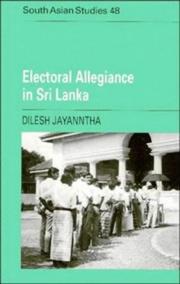
ISBN: 0511521588 0521345863 0521051533 Year: 1990 Volume: 48 Publisher: Cambridge : Cambridge University Press,
Abstract | Keywords | Export | Availability | Bookmark
 Loading...
Loading...Choose an application
- Reference Manager
- EndNote
- RefWorks (Direct export to RefWorks)
Sri Lanka is one of the few new Commonwealth countries to have had a strong democratic tradition and a vibrant electoral life since Independence. In this book, Dilesh Jayanntha examines the basis for Sri Lankan electoral allegiance since 1947. He challenges the prevalent notion that caste is the basis for electoral allegiance and convincingly argues that the patron-client relationship is its primary determinant. Following an introduction outlining recent Sri Lankan political history, Dilesh Jayanntha then examines electoral allegiance in three contrasting constituencies which have a different history up until 1947. Yet, as the author demonstrates throughout, patronage networks determined electoral allegiance, and often, the patronage network was congruent with caste. Yet, as Jayanntha shows, where the patron-client tie cut across the caste tie it was the former which proved decisive in deciding electoral allegiance. This comparative analysis of electorates in Sri Lanka addresses issues that are relevant not only to South Asia but to the developing world in general.
Elections --- Caste --- Manners and customs --- Political aspects --- Sri Lanka --- Politics and government. --- Social Sciences --- Political Science
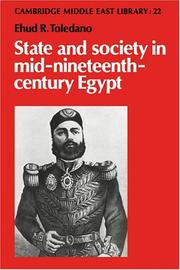
ISBN: 0521371945 9780521534536 Year: 1990 Publisher: Cambridge Cambridge University Press
Abstract | Keywords | Export | Availability | Bookmark
 Loading...
Loading...Choose an application
- Reference Manager
- EndNote
- RefWorks (Direct export to RefWorks)
Social classes --- Social conditions. --- Sociale structuur. --- Staat (politicologie). --- History --- 1800-1899. --- Egypt --- Egypt. --- Politics and government --- Rural conditions. --- -Egypt --- -Rural conditions. --- History of Africa --- Class distinction --- Classes, Social --- Rank --- Caste --- Estates (Social orders) --- Social status --- Class consciousness --- Classism --- Social stratification
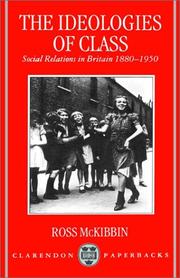
ISBN: 0198221606 Year: 1990 Publisher: Oxford Clarendon
Abstract | Keywords | Export | Availability | Bookmark
 Loading...
Loading...Choose an application
- Reference Manager
- EndNote
- RefWorks (Direct export to RefWorks)
Social stratification --- History of the United Kingdom and Ireland --- anno 1800-1999 --- Great Britain --- Social classes --- -Working class --- -Commons (Social order) --- Labor and laboring classes --- Laboring class --- Labouring class --- Working class --- Working classes --- Labor --- Class distinction --- Classes, Social --- Rank --- Caste --- Estates (Social orders) --- Social status --- Class consciousness --- Classism --- History --- Employment --- History. --- -History --- Grande-bretagne --- Conditions sociales --- 19e-20e siecles
Book
ISBN: 9519498664 Year: 1990 Publisher: Åbo Åbo akademis förlag
Abstract | Keywords | Export | Availability | Bookmark
 Loading...
Loading...Choose an application
- Reference Manager
- EndNote
- RefWorks (Direct export to RefWorks)
Maternal and infant welfare --- -Social classes --- -Class distinction --- Classes, Social --- Rank --- Caste --- Estates (Social orders) --- Social status --- Class consciousness --- Classism --- Social stratification --- Infant welfare --- Infants --- Maternity welfare --- Child welfare --- Mothers --- Women --- Maternal health services --- History --- -History --- -Charities, protection, etc. --- Charities --- Social classes --- -Maternal and infant welfare --- Class distinction --- Charities, protection, etc.
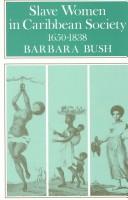
ISBN: 0852550588 085255057X Year: 1990 Publisher: Kingston Heinemann
Abstract | Keywords | Export | Availability | Bookmark
 Loading...
Loading...Choose an application
- Reference Manager
- EndNote
- RefWorks (Direct export to RefWorks)
326 <729> --- Slavernij--(algemeen)--Caraïben. West-Indië. Antillen --- 326 <729> Slavernij--(algemeen)--Caraïben. West-Indië. Antillen --- Social classes --- Women, Black --- Women slaves --- Slave women --- Slaves --- Black women --- Women, Negro --- Class distinction --- Classes, Social --- Rank --- Caste --- Estates (Social orders) --- Social status --- Class consciousness --- Classism --- Social stratification --- History --- Social conditions --- Women, Enslaved --- Enslaved persons --- WOMEN SLAVES --- BLACK WOMEN --- CARIBBEAN AREA --- SOCIAL CONDITIONS
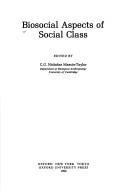
ISBN: 0198577249 Year: 1990 Publisher: Oxford Oxford university press
Abstract | Keywords | Export | Availability | Bookmark
 Loading...
Loading...Choose an application
- Reference Manager
- EndNote
- RefWorks (Direct export to RefWorks)
316 --- Family demography --- Social classes --- Sociobiology --- Biologism --- Human biology --- Human evolution --- Psychology, Comparative --- Social evolution --- Class distinction --- Classes, Social --- Rank --- Caste --- Estates (Social orders) --- Social status --- Class consciousness --- Classism --- Social stratification --- Demography --- Families --- Sociologie --(algemeen) --- Social aspects --- Research --- Family demography. --- Social classes. --- Sociobiology. --- 316 Sociologie --(algemeen)
Book
ISBN: 0520068866 0520078780 0520912721 0585319995 0520354591 Year: 1990 Publisher: Berkeley : University of California Press,
Abstract | Keywords | Export | Availability | Bookmark
 Loading...
Loading...Choose an application
- Reference Manager
- EndNote
- RefWorks (Direct export to RefWorks)
If the conservative view of the American race problem is frightening, the traditional liberal view seems impotent. Analyzing the race problem from neither right nor left, Brooks sheds a new and clarifying light on America's longest running social and moral dilemma.This incisive book provides a bold new examination of the seemingly intractable racial problems confronting Americans at the end of the twentieth century. In a wide-ranging and probing study, Brooks calls into question the prevailing wisdom about racism, civil rights legislation, and the composition of the Black community, going on to offer a dramatic new approach to the race problem. In Brooks' mind, civil rights laws-laws targeted at racial discrimination-have not only failed to engender racial equality, but have in fact had a negative effect on the standard of living of many Blacks. Brooks defines the American race problem so as to carefully separate racial oppression from (economic) class oppression and explains how civil rights legislation since the 1960s has hurt Black Americans of every class. He offers a strategy for resolving the country's racial inequities, unique in its attentiveness to class division in Black society, that combines governmental remedies and an unprecedented program of Black self-help.While Brooks argues that the government has the means to resolve the race dilemma, he suggests that it lacks the spirit to do so. Thus, it may be time for Black Americans to come to grips with an unpleasant reality-namely, that they can count on the government only for minimal alleviation, and must take on the larger portion of responsibility for resolving the American race problem themselves.Certain to arouse controversy, Rethinking the American Race Problem offers new understandings of issues often clouded by misconceptions and backward notions. It is an important book for anyone concerned about the current state of race relations in America.
United States --- Race relations --- African Americans --- Social conditions --- 1975 --- -Social classes --- Civil rights --- Social classes --- Gender & Ethnic Studies --- Social Sciences --- Ethnic & Race Studies --- Civil rights. --- Race relations. --- Afro-Americans --- Black Americans --- Colored people (United States) --- Negroes --- Africans --- Ethnology --- Blacks --- Class distinction --- Classes, Social --- Rank --- Caste --- Estates (Social orders) --- Social status --- Class consciousness --- Classism --- Social stratification --- Race question --- Black people
Book
ISBN: 128285142X 9786612851421 077356215X 9780773562158 0773507167 9780773507166 Year: 1990 Publisher: Montréal [Que.] McGill-Queen's University Press
Abstract | Keywords | Export | Availability | Bookmark
 Loading...
Loading...Choose an application
- Reference Manager
- EndNote
- RefWorks (Direct export to RefWorks)
In Class, Ethnicity, and Social Inequality Christopher McAll discusses the increased juxtaposition of ethnically distinct groups in the same social environments which has resulted from labour migration since the Second World War. He shows that, in the co
Social classes. --- Ethnicity. --- Equality. --- Egalitarianism --- Inequality --- Social equality --- Social inequality --- Political science --- Sociology --- Democracy --- Liberty --- Ethnic identity --- Group identity --- Cultural fusion --- Multiculturalism --- Cultural pluralism --- Class distinction --- Classes, Social --- Rank --- Caste --- Estates (Social orders) --- Social status --- Class consciousness --- Classism --- Social stratification --- sociale ongelijkheid
| Listing 1 - 10 of 19 | << page >> |
Sort by
|

 Search
Search Feedback
Feedback About UniCat
About UniCat  Help
Help News
News